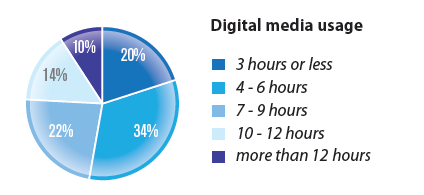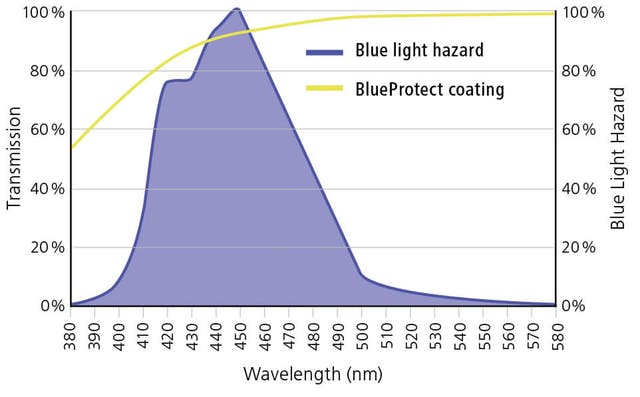What is the hype about blue light, circadian rhythms, blue light glasses, melatonin, smartphones, iPads, computers, and all LED devices? Is it good for us? Is it harmful?
Our bodies have an internal clock that in any given 24 hour period controls sleeping, waking and many other processes of our physiology. Daily exposure to sunlight (which contains blue light) is the stimulus that stops our circadian clock from going out of balance. It can be particularly hard for people who live in Polar Regions, where prolonged dark or prolonged light periods make it hard to regulate their body clocks. It can cause and create a prolonged feeling of jetlag, fatigue, and sleeplessness, and you can end up performing below expectations and potentially put your health at risk.
- Red and irritated eyes
- Dry eyes
- Blurred vision
- Fatigue
- Back, neck and shoulder pain
- Headaches
*2012 VisionWatch Findings: A survey among 10,000 adults across America about their use of digital media and symptoms of visual stress, conducted by The Vision Council.
It is not completely clear why blue light is most important for a good body clock. It is known that the pigmented cells within the retina are activated by blue light and thereby regulate the body clock. Once these Melanopsin receptors are activated they prevent melatonin release during the day and they then begin to increase production in the evening, hopefully, result in good restful sleep. Melatonin is a hormone that is released from the pineal gland, which is located in the center of our brain.
It has been found that with the increase in social media both adults and children who use smart devices well into the evening can find it harder to fall asleep regardless of how late it is. Shift workers can also suffer. Smartphones, computer monitors and TVs can produce large amounts of blue light. This blue light tricks the body in thinking it is daytime, and as a result, suppresses the melatonin release and wakes us up and prevents sleep. The body needs the external cue of morning light shining into our eyes to reset our clocks to regulate our waking time and our sleep time.
Blue light is one of the shortest high energy wavelengths and is within the range 380-500nm. The visible light spectrum, which the human eye can detect, is 390-700nm. The visible light spectrum can be broken down into what we see in the colors of the rainbow –red, orange, yellow, green, blue, indigo and violet. There is evidence that prolonged exposure to this high energy blue light can cause harmful eye damage. Obviously, the prevalence of computer office workers in the Sydney CBD means an increase in the amount of blue light we are exposed to.
There is a large body of evidence that suggests blue light interferes with sleep. It can reduce overall sleep time and it does reduce the production of melatonin. The sleep quality is often also affected by lighter sleep levels and broken sleep. Blue light has also been found to increase body temperature at night further inhibiting the body from progressing into sleep. Other studies have shown that the exposure of red light in the evening for equivalent periods of blue light exposure resulted in the lowering of body temperature and better sleep quality.
The effect of poor sleep is not just about poor work performance and catnaps but it can have a serious impact on Sydney office workers health potentially reducing immunity, causing hypertension and poor blood sugar control for diabetics. It is thought by some that too much exposure to blue light could increase the development of macular degeneration as blue light is easily transmitted to the retina.
So we have heard that blue light is harmful and blue light glasses can help Sydney office workers, but there is another side to the story that suggests blue light is beneficial?.
Exposure to blue light during daylight hours can –
- Increase attention and alertness
- Increase reaction time
- Lessen daytime fatigue and sleepiness
- Lengthen attention span
We don’t need continuing exposure to blue light to get its advantages. Even thirty minutes of blue light exposure in the morning can achieve the items listed above.
Blue light glasses are available in Sydney in both prescription and non- prescription forms. A comprehensive eye examination is recommended as a first step to discuss the need and benefits of blue light control glasses. Our Sydney CBD optometrists can check your vision, measure any refractive error (the basis to decide if spectacles are needed) and do a health assessment. Often this can be bulk billed eye test performed at a convenient time for you from our central Sydney office.
If the need for a prescription is established, then the Optometrist or one of our qualified Optical Dispensers will discuss alternatives of methods of blue light control in your glasses.
There are many designs of spectacle lenses including single vision, bifocal, multifocal, desk style, anti-fatigue and more. In most cases, special blue control anti-reflection coatings are available in both stock and especially ground prescription lenses. At Personal Eyes Optometry in Sydney, some of these blue light glasses can be produced the same day.
Most people will not notice any particular difference from their current untreated lenses, but on careful inspection of blue light, glasses may reveal a slight tint that is visible against a white background. For this reason, blue light glasses may not be suitable for some occupations.
Some examples of available lens types from the manufacturers are –
- Rodenstock Balance
- Hoya Blue Control
- Carl Zeiss Duravision Blue Protect
- Nikon SeeCoat Blue UV
- Opticare Blue Guardian
- Essilor Crizal Prevencia
At Personal Eyes Optometry in the Sydney CBD, we have had feedback from some of those that have been using their blue light control glasses and the general consensus has been a noticeable reduction in eyestrain and eye fatigue.
Many of the smart devices today have the option of blue light filtering apps available within their operating system. Apple, for instance, has Night Shift that allows the screen lighting to be shifted to a warmer color. This can be a simple adjustment made from Settings on the control panel, and this, of course, can then be readjusted back to normal for daytime settings.
In summary blue light is both essential for wellness but it can create problems with good sleep and our circadian clock. Melatonin is essential for good sleep and indeed, these days, many people do have it prescribed as a supplement by their GP, particularly those with auto-immune disorders.
Remember that with good daylight exposure we can improve our mood, our memory, and motor skills, improve attention and therefore strengthen our circadian rhythms resulting in an improvement on our night sleeping. To assist we can use our blue light glasses to reduce the fatigue and eyestrain that Sydney computer users get with many of these LED Smart devices.
Alternatively, we can reduce the use of these devices at night (or better still to avoid them) or refrain from using them 1-2 hours before bed and if possible, do not recharge them by your bedside, removing the temptation to use them.
For a Medicare Eye test and assessment of your need for blue light, glasses call us on 9235 2236 at Personal Eyes Optometry in heart of the Sydney CBD.

